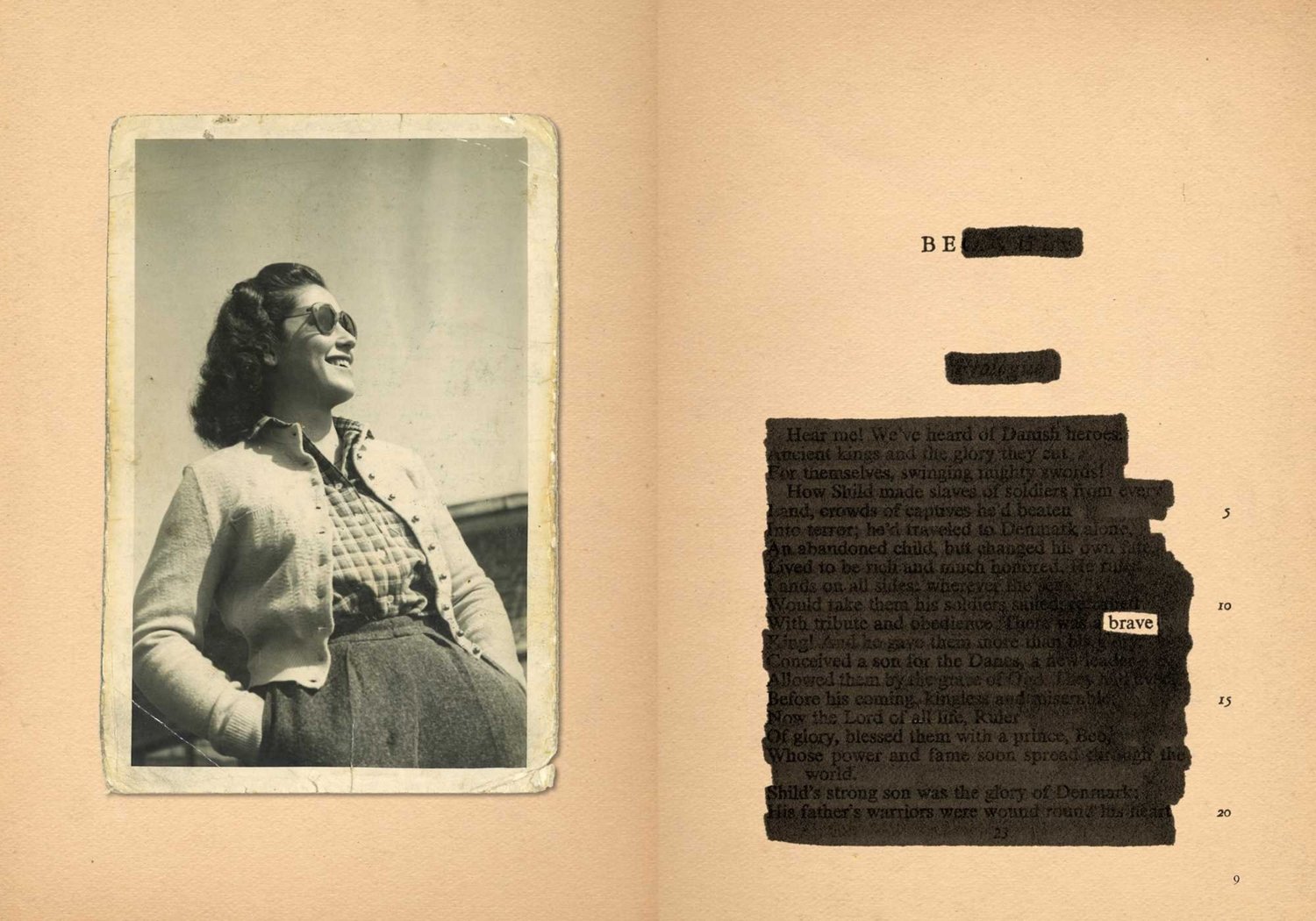J.M. Farkas Talks Blackout Poetry and What it Means to Be Brave
“Poetry feels like lightning to me — It’s this incredible jolt of feeling and emotion and power and recognition”
Erasure, or blackout poetry, is a unique type of art—one where the poet must use the words that they are given and create something completely new with them. “You are restricted to the form and the words in front of you, but there is an endless sense of possibility, in terms of the words you choose to abandon or keep,” says poet J.M. Farkas.
Farkas’ own erasure collection Be Brave, published in April, uses the classic text, Beowulf, to create a new work focused on the resilience, strength, and bravery of women.
J.M Farkas is a former high school teacher, a dental school drop out, and a YA novelist who has been published in The New York Times, Buzzfeed, Alma, NCTE, and Electric Literature.
I connected with Farkas via email where she discussed what drew her to Beowulf, what bravery means to her, “book-fate” and what classic she will be working with for her next collection.
___
Kailey Brennan: I’m fascinated by your erasure poetry collection Be Brave. Can you speak about how this idea came about? What attracted you to blackout or erasure poetry?
J.M. Farkas: I learned about erasure when I was studying poetry in graduate school. I was so lucky to work with phenomenal teachers, such as Mary Ruefle and Jen Bervin, who have also created wonderful works of erasure. Jen Bervin’s Nets is an erasure of Shakespeare’s sonnets, and Mary Reufle has a book called A Little White Shadow that is the erasure of a more obscure 19th-century book.
One thing that attracts me to erasure is tension. You are restricted to the form and the words in front of you, but there is an endless sense of possibility, in terms of the words you choose to abandon or keep.
KB: Why the story of Beowulf? What do you like or dislike about this classic?
J.M.: I stumbled upon a copy of Beowulf when I was browsing a used bookstore in my neighborhood. It was the same version of Beowulf that I taught my 9th graders when I was a high school English Teacher. In the introduction to Be Brave, I talk about something I like to call “Book-Fate” – that just like certain people, the right book can come into your life at exactly the right time and for a very specific reason.
To be honest, I didn’t love Beowulf (I’m more of a mythology and Odyssey kind of girl); but I was excited about the idea of transforming classic literature into something very modern and unlike the original text. I also liked the idea of transforming a war story into a book on heartbreak – as the famous song goes, “love is a battlefield.”
KB: This collection has been described as an “ode to women and their resilience.” How do you feel women are resilient? What do you hope your readers take from reading this collection?
J.M.: I hope readers take away a sense of hope, surprise, and ultimately—comfort. I like to say that my favorite reading experiences are to be devastated and/or delighted. So, if I could pull off either of these, that would be the ultimate compliment
KB: What does bravery mean to you?
J.M.: I’ve come to understand that it is impossible to be brave without being vulnerable. I also think it takes a lot of bravery to be a writer and to put your work out there. It can be a bit excruciating for me because I’m a private person, but I almost never regret taking that risk.
KB: As a former high school English teacher, what made you embark on a new path? What lessons did you learn from teaching others?
J.M.: In some way, I will always be a teacher, and I continue to return to teaching in many forms. Most recently, I taught writing to college freshmen. I do find it difficult, however, to teach and write at the same time. Originally, when I quit my teaching position, it was because I realized that I had channeled all of my energy into my students and their work, and I realized I was losing sight of my own work.
Teaching is an incredible learning experience, and I think everyone should try it once so they understand how very hard it is. Although I learned a lot about the literature I taught, I really learned the most from my students. I had so many unforgettable students, who shared so much of their lives with me in their writing and outside of it.
KB: What does poetry mean to you? How poetry has affected your life in a way other genres like fiction or non-fiction haven’t?
J.M.: Poetry feels like lightning to me. The quickness of it really appeals to me. It’s this incredible jolt of feeling and emotion and power and recognition, and I love that you can access it at any point in the day, and be completely transformed, but no one would necessarily know it.
KB: Do you participate in spoken word poetry? If yes, can you share your experience?
J.M.: I have never participated in spoken word as a poet, but when I was living in NYC, I was a big fan. I also made sure to share this kind of poetry with my students when I was a teacher. I love the movie SlamNation and integrated it into the curriculum.
KB: What are some of your future poetry goals?
J.M.: I’d like to continue to straddle many poetry worlds, in the sense that I write erasure poetry, but I also write “regular” poetry and hope to continue publishing this kind of work in literary magazines. I’m excited about my next book, How to Be a Poet, which is an erasure of Ovid and comes out this fall.




